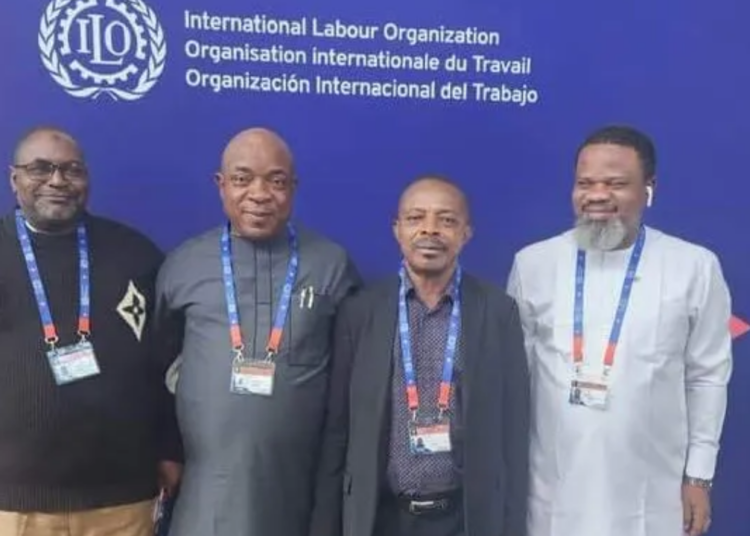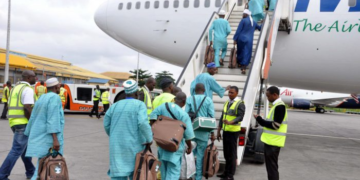Federal government has reaffirmed its commitment to fostering a culture of constructive social dialogue and promoting decent working conditions in Nigeria, ensuring a fair and equitable work environment for Nigerian workers.
This was highlighted by the federal government‘s policies targeting food security, job creation, poverty alleviation, and social cohesion, aligning with President Bola Ahmed Tinubu‘s “Renewed Hope Agenda.” The minister of state for labour and employment, Barr. Nkeiruka Onyejeocha, made these remarks in her speech at the 112th Session of the International Labour Conference in Geneva, Switzerland, as a response to the director-general‘s report on the renewed social contract, outlining Nigeria‘s position on the global agenda for decent work and social justice.
She applauded the director-general‘s office for selecting a timely and relevant theme highlighting the mutual interdependence between individuals and societies in promoting social unity, economic robustness, and political stability.
She observed that this year‘s theme aligns perfectly with President Bola Ahmed Tinubu administration‘s „Renewed Hope Agenda,” a visionary policy framework designed to transform Nigeria into a premier investment hub on the global stage.
The minister said, “The agenda is hinged on the Core Pillars ‚4-D Diplomacy Strategy‘ centred on promoting democracy, driving economic development, harnessing Nigeria‘s demographic potential, and engaging with the diaspora community.
“The eight Priority Areas of the Agenda aim to pursue economic prosperity for the country through food security, poverty eradication, economic growth, job creation, access to capital, inclusiveness, improving the security of life and property, the rule of law, and fighting against corruption.
“This will help build a more just and equitable society, reminding both Nigerians and the global community that Nigeria stands ready to embrace the future and conduct business in line with International Best Practices.
„The Nigerian government has provided an enabling environment for social dialogue with the tripartite constituents to advance social justice and has solicited tripartite plus cooperation to align with the government‘s agenda in the labour sector to promote workers‘ welfare and boost national productivity,“ she said.
Onyejeocha identified the following areas where the government has made giant strides: „Implementation of the Decent Work Country Programme III; Ratification of the 10 ILO Fundamental Conventions and most recently ratified 4 additional Conventions, including Convention 190 on Violence and Harassment; Revival of the National Labour Advisory Council, Nigeria‘s highest tripartite consultative structure; Tremendous progress in the review of our Labour Law.
„Establishment of Job Centres across the country; Upgrading Skill Acquisition Centres across the six geopolitical zones; Establishment of Migration Resource Centres, as part of the government‘s commitment to providing good governance for Labour Migration; Reducing child labour to the barest minimum by promoting universal basic education and encouraging school enrolment of minors, especially for the girl child; Granting direct loans to farmers in the agricultural sector geared towards food security; and Provision of potable water, energy, and massive road infrastructure, just to mention a few.“
She said on the new national minimum wage, „the federal government is currently negotiating through its tripartite committee to review the National Minimum Wage as part of its efforts to promote decent work for workers in both the public and private sectors.“
The minister further showcased Nigeria‘s progress in implementing international labour standards, promoting social justice, and boosting national productivity through the recent launch of the Labour Employment and Empowerment Programme (LEEP), which aims to create jobs and equip youth with entrepreneurship skills.
„The government also recognizes skill acquisition as a viable strategy for youth empowerment and job creation, and has identified the informal sector as the driving force of economic growth in most developing countries of the world.
„As an intentional strategy towards achieving the goals of the Renewed Hope Agenda, the Federal Government launched the Labour Employment and Empowerment Programme (LEEP) on Thursday, April 25, 2024, with the fundamental vision to create jobs by training and equipping 2.5 million persons every year within the next four years with requisite entrepreneurship skills.
„The government‘s efforts towards promoting entrepreneurship will revamp Nigeria‘s economy, reposition it on the path of steady growth, enhance job creation, and reduce unemployment and insecurity,“ she said.
In concluding remarks, the minister emphasised the need for global cooperation to address technological challenges and build a more resilient and inclusive society for future generations.











